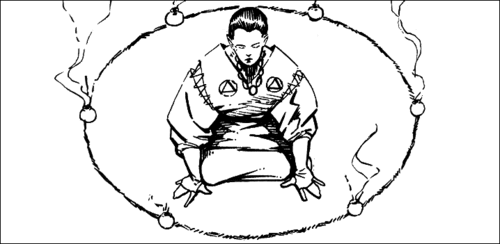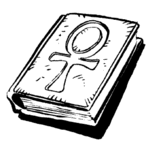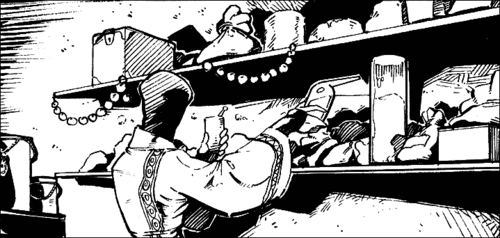Britannian magic
This article is about magic appearing in most Ultima games set in Britannia. For magic in Ultima IX, see Ultima IX magic.
The magic of Britannia is a highly complex art, which only very few can master. The ability to perform magic cannot be learned. Either it is with the mage from birth, or it will never come at all. Even if the ability is there, it takes years to learn the art. Once it is learned, the mage can accomplish feats both devastating and constructive. To perform magic successfully, several things have to be in the possession of or known by the caster.
This section will explain how magic in Britannia works in the Ultima series, and what rules need to be followed when casting a spell.
Magic Before Modern Britannia[edit]
As more and more information about the art of magic has been discovered, the rules of casting spells have changed significantly over time.
During the Age of Darkness (up to Ultima III), no reagents were needed for spellcasting, and the now well-known words of power were not yet in use. Although many spells of this time resembled their more modern counterparts (at least in effects), the final results of these earlier incantations could be somewhat unstable and highly ritualized processes were needed to make magic reliable. For more on that time, see "Sosarian magic".
After the founding of Britannia, in the first two Ages of Enlightenment (Ultima IV and Ultima V), the spells of magic had to be mixed manually by combining the reagent after strict guidelines. These mixtures were then used in combination with speaking the correct words of power to activate them, destroying one "use" of the mixture in the process. Also, in the early Age of Enlightenment, the now discovered rules of the magic circles was yet undiscovered and the selection of spells followed no set pattern.
From Ultima VI onward, the current rules apply for all magic in Britannia.
The Spellbook[edit]
For the mage the spellbook is the most central and important part of casting spells, as without it no magic can be performed. In the spellbook, all spells known to the mage are written down for easy access. Spells can be learned from other mages – of course for a fitting price – and then recorded in the book for later use. Typically, the more experienced a mage is, the more valuable the spellbook becomes. Very experienced mages can even create their own spell and then add these to their spellbooks.
Spellbooks came into widespread use beginning with Ultima VI. Before that time, spellbooks were not required and the spells were mixed directly. In Ultima V, magic scrolls appeared which duplicated the various spell effects, but they were somewhat impractical and fell out of use rather quick. Starting with Ultima VI, spellbooks could be readily bought from other mages, and Lord British has one ready for the Avatar at the beginning of both this game and in his castle in Ultima VII. A few other spellbooks can be found in the latter game, but these do not have any real use and sport numerous gaps in the spell selection.
Spellbooks would go on to continue being the centerpiece of all magic in Britannia even in a different age.
Reagents[edit]
The other components needed for the spellcaster to practice magic are reagents, chemical substances that provide a link between the physical world of the spellcaster and the ethereal waves of magic. Each reagent can be found in specific places, or be purchased from other mages who deal in such transactions. Reagents have to be prepared in a special manner before they can be used to cast any spells.
For information where to buy the various reagents, complete with prices, see Reagents.
The following reagents have been in use ever since Ultima IV, where the magic system was first altered significantly, becoming more complex. These have consistently appeared in every Ultima installment set in Britannia:
Black Pearl[edit]
Fewer than one in ten thousand pearls is black. These pearls have been mainly found at the base of tall cliffs surrounding Buccaneer's Den, although other beaches in Britannia are not out of question. Black pearl is ground up into a fine powder for use as a reagent. The black pearl reagent is used as kinetic propellant in spells.
These pearls can be bought from reagent vendors, although prices are high due to rarity. There also is confusion if a perfect black pearl is needed for spellcasting, as sources are conflicting. (Though if only perfect pearls are to be used, the price should and would be much higher than it already is, and the Book of Mystic Wisdom specifies that having to use perfect pearls would bankrupt a score of wizards and as such it is the cheaper imperfect pearls that are used as magical reagents.)
Blood Moss[edit]
The only places where this strange substance – which in reality is a fungus instead of a moss – can be located, are in the Bloody Plains across the mountains from Cove, where many years ago thousands of soldiers lost their lives, or in the enchanted forest of Spiritwood, beneath the rotting bark of dead trees. Blood moss is used to enhance mobility and movement in a spell.
Blood moss can be bought in reagent shops without much of a problem due to a steady supply.
Garlic[edit]
There are few kitchens in all of Britannia that are not supplied with at least a few cloves of this spice, which is infamous for the strong odor it creates. Garlic cloves are washed and ground into a paste for usage as a spell reagent, providing significant protection from harmful magic.
Garlic is a common spice, and thus can be bought nearly anywhere, even at a farmers' market.
Ginseng[edit]
The healers of Britannia have known of the healthful and restorative powers of this bitter root for hundreds of years. But to the mage it requires special preparation before it can be used in casting. It must be boiled and reboiled in the freshest of water no less than forty times! This reduces it to a strong-smelling syrup that makes a very potent reagent.
Ginseng is commonly found for sale in reagent shops, as the plant is not rare.
Mandrake Root[edit]
A most sought after magical reagent is this man-shaped root. It is one of the most difficult of all reagents to prepare, for in being dug up the tap root of the mandrake plant must not be broken. Also, that root itself must be properly prepared, boiled and dried. Mandrake root can be found in the Bloody Plains and in a swamp known as the Fens of the Dead, south of Paws. As a reagent it increases the power of the desired enchantment.
At the time of the Quest of the Avatar, mandrake root can only be found. Later, it can be found for sale at reagent vendors, usually at highly inflated prices due to the limited supply.
Nightshade[edit]
Nightshade used for spellcasting is not to be confused with the rank-smelling plant of the same name. The fungal cap from this rare and unusual mushroom may be either crushed or boiled into a tea. The mage must always use great care when handling nightshade, for it is not only a very potent hallucinogenic, it is also extremely poisonous. This reagent adds illusion or poison effects to a spell.
Nightshade can only be acquired through searching during the Quest of the Avatar in the deepest Spiritwood or near the Shrine of Sacrifice. It can be bought in later times in shops, but is usually expensive.
The description of nightshade is misleading in Ultima IX, where it was said to be a leaf plant, which goes against all information previously known.
Spider Silk[edit]
While this silk from spiders is a common reagent, it can be very difficult to gather any significant quantity of it from any single source. Mages have been known to frequent caves and crypts and even run their own personal spider farms of giant spiders in order to maintain an abundant supply of spider's silk. It usually takes at least an ounce of silk to cast a spell. This reagent adds binding powers for spells.
Spider silk can be bought at reagent vendors and occasionally found in spider colonies.
Sulfurous Ash[edit]
The great quantities of ash generated by a volcanic eruption makes this a common commodity as far as magical reagents go, but one usually has to travel in order to acquire a large quantity of it, since the active volcanoes of Britannia are mainly located on the Isle of the Avatar and some other islands. Adds high levels of energy to the spells which require it as a reagent.
One of the more common reagents, sulfurous ash can be readily purchased or found in volcanic places like the Isle of the Avatar.
Incantations[edit]
This section is about incantations using Britannian magic, sometimes called “Words of Power”. For Words of Power that open dungeons in Ultima V, see Words of Power (dungeons).
- Main article: Incantation
In Ultima V, the magic words had to be typed in by hand. From Ultima VI onward, the engine relieved the player of this burden, thus making spellcasting much easier.
The Spells and Casting[edit]
Casting a spell is done by holding the spellbook in one hand, open to the page containing the desired spell, and chanting the right incantation. The prepared reagents are actually not required to be held in the other hand; they need only be in the possession of the spellcaster. They will vanish in the right quantity as the spell's effects take place. However, for this to happen, the mage also needs to be experienced enough for the Circle of Magic in which the spell is located.
There are a great number of magic spells in the Britannian magic system – far too many to list on this page. Therefore, they are found in their own category: Britannian Spells.
For where to buy the various spells to which prices, see:
Lore[edit]
| “ | Know ye, O seeker of the mystic wisdoms, that the ways of magic are diverse and strange. There exists the need for utmost concentration and the harvesting of things magical in order that ye may harness the powers of the universe. Many are the eons of wisdom contained in these pages which I write for the benefit of my pupils, yet still there is much to learn. All magic is accomplished by the use of means both human and of nature, for true magic, is but the melding of human will and natural force. Without the human voice to utter the chant, no spell may be cast. Yet without the proper natural catalyst, no spell may be effective. Thus magic is twofold, a balance struck between nature and humanity. – from The Book of Mystic Wisdom (Ultima IV)
|
|---|
| “ | No one knows exactly when the powers of magic were discovered. Little by little, stories of impossible coups and miraculous recoveries increased in number and detail, until finally even the most skeptical people began to give credence to some mystic factors. And only then did the serious scholarly search for magical means and lore begin. Few remain who do not accept the reality of magic. Yet the knowledge of magic and its use appears to be in its infancy. There are few formal schools in which to learn magic. To be a user of magic, one must travel far and wide to learn from various mages who have developed and honed special magical abilities. Even then there is no guarantee the mages will impart their knowledge. Spells diverge greatly in terms of difficulty, and, correspondingly, in terms of danger to the caster. After years of observation and experimentation, scholars in magic have classified spells into eight circles of difficulty. Thus, mages who can command only the simplest spells are considered to be of the first circle, and so on. Full mages’ magical ability is directly related to their intelligence. Bards appear to have half the magical ability of full mages and fighters rarely have any. Casting spells drains magical powers, limiting how many spells mages can cast before resting. A spell will drain magical powers in amounts proportional to the spell’s circle of difficulty. – from The Book of Lore (Ultima V)
|
|---|
| “ | Magical energy is structured as eight concentric spheres each composed of networks of light connected to the physical plane by unseen bonds. The spellcaster stands within the center sphere, extending his hands within the outer shells of light where he manipulates the energies to suit his pleasure. In one hand, he holds his spellbook, open to the page containing the description of his chosen incantation. In his other hand, he clutches a vial containing herb and mineral reagents, the mixture serving as the catalyst for his spell. Thus prepared, he utters the incantation, fusing matter and energy into a display of power. The spell has been cast, leaving the caster drained in spirit, but fulfilled in accomplishment. Mages with little training and experience are limited in the spells they can cast. As a spellcaster grows in stature, penetrating the mysteries of the highest circles of magic, he gains the ability to cast more powerful spells. Great power is not without cost, however. When he casts a spell, the mage experiences a drain in magical power equal to the level circle of that spell. Thus, a simple first level spell drains one point while a fifth level spell, more difficult to cast, drains five. The caster’s magical power returns within a few hours. – from Compendium (Ultima VI)
|
|---|
| “ | Before anything further is written, it must be noted that the following section is included only as a matter of historical documentation. The use of magic has long been proven to be unreliable and the suspected cause of mental deterioration. The author takes no responsibility for anyone who may attempt to practice magic based upon the information contained herein. – from The Book of Fellowship (Ultima VII)
|
|---|
| “ | Mages are almost as varied as the art they practice. Some prefer to select their spells based on a specific element, such as fire. Others choose based on how malevolent they want their effects to be. And still others combine these two methods and more! Typically speaking, the less complex a spell is, the greater the chance a particular mage will have it to sell — and the greater the chance that a studying wizard will be able to comprehend it! To illustrate, consider that all of Britannia’s mages know every Linear spell and several First Circle spells, whilst the very same enchanters will know but, perhaps, no more than one or two in the Eighth Circle. An interesting aspect of magic is that, although the caster must possess a certain degree of ability, spells of any circle may be transferred between spell books regardless of each individual’s power. Of course, with the rather odd and mysterious direction that magic is currently taking, very few wizards can access any magic. Interestingly enough, this does not yet seem to affect their ability to transfer — that is, sell — spells. – from Key to the Black Gate (Ultima VII)
|
|---|
Ultima V: Lazarus[edit]
This is an Ultima V: Lazarus-related article or section. The information within may not apply to Ultima V or other Ultima games.
In Ultima V: Lazarus, the mixture system of the original game is abandoned and the system used in later installments used instead. Thus each character has a spellbook and reagents have to be bought to use magic. Spells are selected from the spellbook and then cast automatically, without having to type in the incantation. Unlike later games, spells are learned automatically when leveling up, though some classes do have restrictions up to which circle they can learn spells, or some spells are forbidden.
| Magic Systems | |
|---|---|
| Sosaria | Sosarian magic |
| Britannia | Britannian magic ☥ Britannian spells ☥ Ascension magic ☥ Rituals ☥ Ultima VII (SNES) |
| Serpent Isle | Serpent Isle magic ☥ Serpent Isle spells |
| Pagan | Pagan magic ☥ Pagan spells ☥ Necromancy ☥ Tempestry ☥ Theurgy ☥ Sorcery ☥ Thaumaturgy |
| Other | Runic magic ☥ Runic spells ☥ Savage Empire magic |










